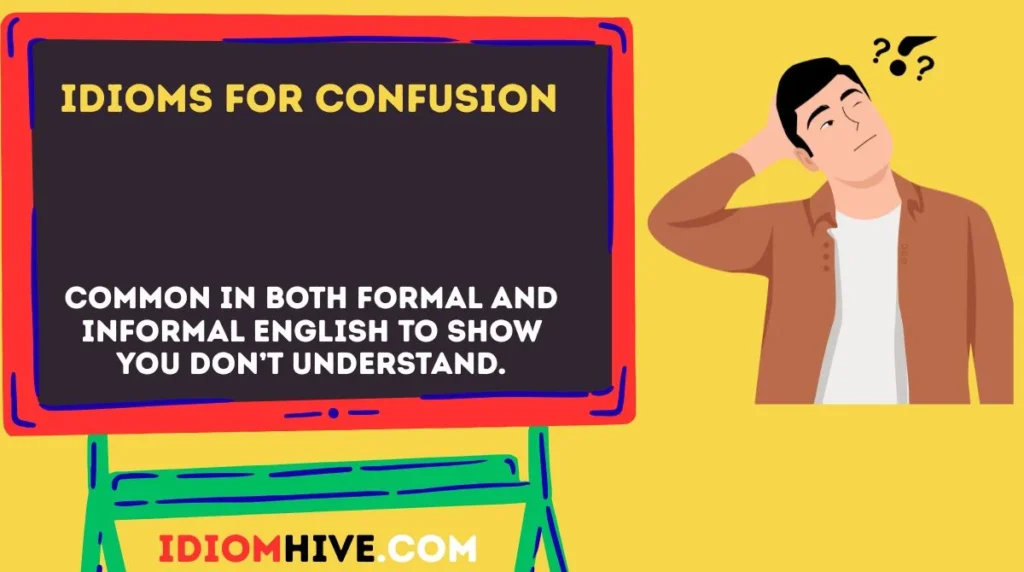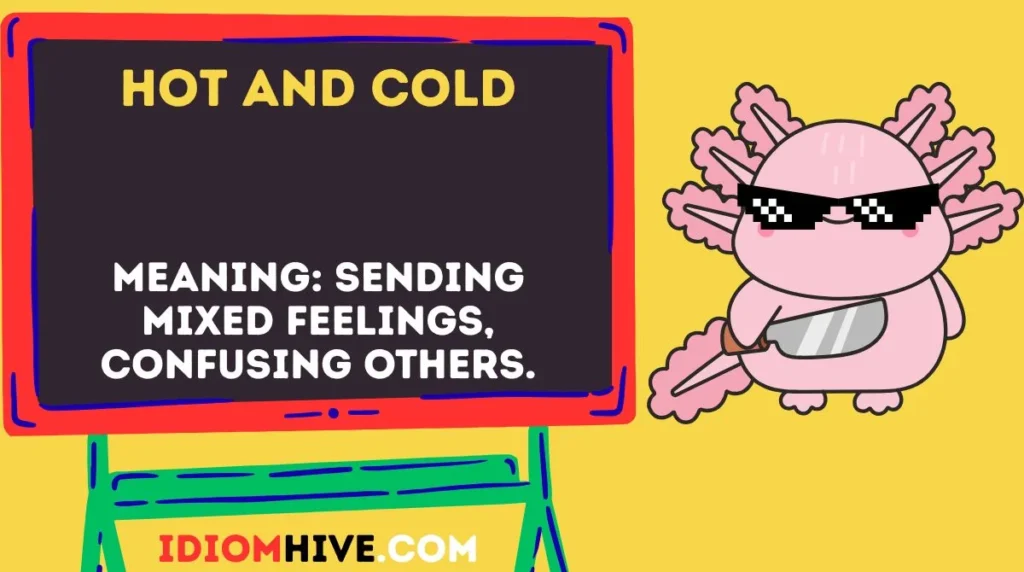English is a colorful language filled with idioms — short phrases whose meanings are not always obvious from the words themselves.
Idioms make conversations lively, help you sound more natural, and capture feelings that simple words often can’t. When it comes to describing confusion, idioms are especially useful. Instead of saying “
I don’t understand” again and again, you can use creative expressions that show exactly how puzzled, lost, or mixed-up you feel.
In daily life, confusion is common — whether it’s about making decisions, understanding instructions, or solving a tricky problem.
That’s why learning idioms for confused situations can help you speak more fluently, write with more personality, and connect with others naturally. Let’s dive into some of the most common and fun idioms people use when they feel puzzled or uncertain.
Did You Know?
The word confuse comes from the Latin “confundere,” which means to pour together or mix up. This is why many idioms for confusion often use imagery of mixing, fog, or being lost — they reflect the feeling of things blending into a mess inside your head!
Idioms for Confusion and Being Puzzled

At sea
Meaning: Feeling lost or unsure.
Example: I was completely at sea during the math lecture.
Alternative: All at sea.
Reflection: Common in both formal and informal English to show you don’t understand.
In a fog
Meaning: Not able to think clearly.
Example: After the long flight, I felt in a fog all day.
Alternative: In a haze.
Reflection: Often used to describe mental tiredness or disorientation.
In a daze
Meaning: Stunned or confused.
Example: She was in a daze after hearing the shocking news.
Alternative: In a trance.
Reflection: Informal, often used in emotional or surprising situations.
At a loss
Meaning: Not knowing what to say or do.
Example: He was at a loss for words when asked about the mistake.
Alternative: Speechless with confusion.
Reflection: Used in both professional and casual settings.
Head in the clouds
Meaning: Not paying attention or confused by daydreaming.
Example: Don’t ask her right now, she has her head in the clouds.
Alternative: Absent-minded.
Reflection: Informal, often used to tease someone.
Draw a blank
Meaning: Unable to remember something.
Example: I tried to recall his name but drew a blank.
Alternative: Mind went blank.
Reflection: Informal, used in daily conversations.
Out to lunch
Meaning: Not alert, confused, or behaving strangely.
Example: He forgot the meeting again — he’s totally out to lunch.
Alternative: Not all there.
Reflection: Informal, often humorous.
In the dark
Meaning: Not informed or confused about something.
Example: I felt in the dark about the company’s decision.
Alternative: Kept in the dark.
Reflection: Can be formal or informal.
All over the place
Meaning: Disorganized or confused.
Example: My thoughts are all over the place today.
Alternative: Scattered.
Reflection: Informal, often used about emotions or thoughts.
Don’t know which way is up
Meaning: Extremely confused or disoriented.
Example: After working 12 hours, I don’t know which way is up.
Alternative: Turned around.
Reflection: Casual, everyday English.
Idioms About Mixed-Up Thinking
Mixed signals
Meaning: Confusing or unclear messages.
Example: She’s giving me mixed signals about her decision.
Alternative: Sending conflicting messages.
Reflection: Common in relationships and communication.
Crossed wires
Meaning: Misunderstanding between people.
Example: We must have got our wires crossed about the meeting time.
Alternative: Miscommunication.
Reflection: Informal but widely used.
Up in the air
Meaning: Uncertain or undecided.
Example: Our travel plans are still up in the air.
Alternative: Not settled.
Reflection: Common in everyday and workplace conversations.
Can’t make heads or tails of it
Meaning: Unable to understand something.
Example: I can’t make heads or tails of this legal document.
Alternative: Totally baffled.
Reflection: Informal but very common.
Turned around
Meaning: Confused about direction or situation.
Example: I got turned around in the new city.
Alternative: Lost.
Reflection: Often used literally or mentally.
Mind-boggling
Meaning: Extremely confusing or hard to understand.
Example: Quantum physics is mind-boggling to me.
Alternative: Head-spinning.
Reflection: Used in casual speech or writing.
In two minds
Meaning: Unsure about a decision.
Example: I’m in two minds about accepting the job.
Alternative: On the fence.
Reflection: British English, used in daily speech.
Baffled
Meaning: Completely confused.
Example: I’m baffled by how this machine works.
Alternative: Perplexed.
Reflection: Neutral, works in both formal and informal English.
Out of sorts
Meaning: Feeling a bit confused, unwell, or not right.
Example: He seemed out of sorts after the long day.
Alternative: Off balance.
Reflection: Informal, often about mood or state of mind.
Hot and cold

Meaning: Sending mixed feelings, confusing others.
Example: She runs hot and cold about their relationship.
Alternative: Blowing hot and cold.
Reflection: Common in personal relationships.
Idioms About Forgetfulness and Distraction
Slipped my mind
Meaning: Forgotten completely.
Example: I’m sorry, your birthday slipped my mind.
Alternative: Forgotten.
Reflection: Casual, everyday usage.
Mind went blank
Meaning: Suddenly unable to think.
Example: During the presentation, my mind went blank.
Alternative: Drew a blank.
Reflection: Common in exam or speech contexts.
Lost track
Meaning: To stop noticing time or details.
Example: I lost track of time while studying.
Alternative: Unaware.
Reflection: Informal, widely used.
Absent-minded
Meaning: Often forgetful or distracted.
Example: She’s so absent-minded she left her keys again.
Alternative: Forgetful.
Reflection: Neutral, slightly formal.
A brain fade
Meaning: Temporary mental confusion or forgetfulness.
Example: I had a brain fade during the test.
Alternative: Blank moment.
Reflection: Informal, often used in sports or exams.
Scatterbrained
Meaning: Disorganized and forgetful.
Example: He’s too scatterbrained to manage a schedule.
Alternative: Airheaded.
Reflection: Informal, usually light teasing.
Clouded judgment
Meaning: Confused thinking due to emotions.
Example: His anger clouded his judgment.
Alternative: Blinded by emotions.
Reflection: Used in serious or professional contexts.
In a muddle
Meaning: In a mess or confused.
Example: My notes are all in a muddle.
Alternative: Mixed up.
Reflection: British English, casual usage.
Forget one’s bearings
Meaning: Lose sense of direction or situation.
Example: After the storm, I forgot my bearings in the forest.
Alternative: Disoriented.
Reflection: Literal and figurative use.
Lose one’s train of thought
Meaning: Forget what you were saying.
Example: I lost my train of thought during the speech.
Alternative: Got sidetracked.
Reflection: Informal, common in conversations.
Idioms About Overthinking and Uncertainty
Tie yourself in knots
Meaning: Get confused by overthinking.
Example: She tied herself in knots trying to explain.
Alternative: Overcomplicate.
Reflection: Informal, daily life expression.
Go around in circles
Meaning: Keep talking or thinking without reaching a conclusion.
Example: We went around in circles discussing the same problem.
Alternative: Running in circles.
Reflection: Neutral, used in both work and casual talk.
Between a rock and a hard place
Meaning: Stuck between two difficult choices.
Example: He’s between a rock and a hard place with his career decision.
Alternative: Caught in a dilemma.
Reflection: Formal and informal use.
On the fence
Meaning: Unable to decide.
Example: I’m still on the fence about moving abroad.
Alternative: In two minds.
Reflection: Common in both speech and writing.
All mixed up
Meaning: Emotionally or mentally confused.
Example: She’s all mixed up after the breakup.
Alternative: Disoriented.
Reflection: Informal and emotional.
Not add up
Meaning: Something doesn’t make sense.
Example: His story doesn’t add up.
Alternative: Suspicious.
Reflection: Informal, often about lies or mistakes.
Tongue-tied
Meaning: Unable to speak clearly out of confusion or nervousness.
Example: He was tongue-tied during the interview.
Alternative: Lost for words.
Reflection: Informal, emotional or nervous contexts.
Puzzle over
Meaning: Think hard but remain confused.
Example: She puzzled over the math problem for hours.
Alternative: Struggle with.
Reflection: Everyday usage, especially about thinking.
How to Use These Idioms in Daily Life
- In speaking: Use idioms to sound more natural in conversations. For example, instead of saying “I don’t understand this,” you can say “I can’t make heads or tails of this.”
- In writing: Idioms make emails, blogs, or even stories more colorful. Example: “The project details are still up in the air.”
- In professional settings: Some idioms, like “in the dark” or “clouded judgment,” are excellent for formal reports or business discussions.
Common Mistakes Learners Make With Idioms
- Using idioms too literally
❌ Wrong: I am really in a fog, I can’t see anything.
✔ Correct: I am really in a fog, I can’t think clearly. - Mixing idioms incorrectly
❌ Wrong: I lost my blank.
✔ Correct: I drew a blank. - Overusing idioms
Using too many idioms in one sentence can confuse listeners. Balance idioms with plain English for clarity.
FAQs
1. What does it mean to be “at sea”?
It means to feel lost, confused, or unsure about something.
2. Can idioms for confusion be used in formal writing?
Yes, but carefully. Idioms like in the dark or clouded judgment fit better in formal writing than informal ones like out to lunch.
3. Are idioms the same in British and American English?
Some idioms are universal, but others differ. For example, in two minds is more British, while on the fence is more American.
4. How can I remember idioms better?
Practice using them in sentences, connect them with real-life situations, and group them by themes like we did here.
5. Do idioms always mean confusion?
No, idioms can describe all emotions and situations. Here, we only focused on those showing confusion.
Conclusion
Confusion is part of everyday life, and English has plenty of creative idioms to describe it. From at sea to go around in circles, these expressions help you express puzzlement in fun, natural, and engaging ways.
By practicing these idioms in conversations, writing, or professional contexts, you’ll not only improve your fluency but also sound more like a native speaker.
Next time you’re puzzled, instead of saying “I don’t get it,” try one of these idioms — and you’ll instantly add charm and clarity to your English.










